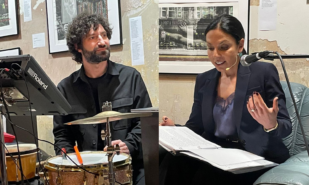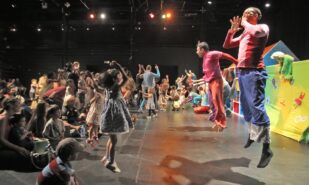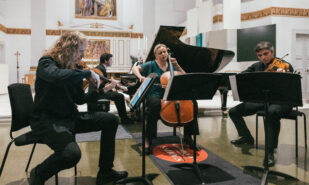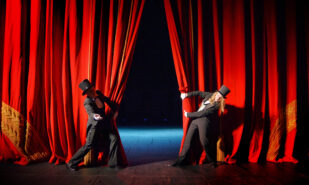Fidelio at RBO: a dynamic and intelligently topical production shows fidelity to Beethoven
Beethoven’s only opera ‘Fidelio’ is running at London’s Royal Ballet and Opera until 26 October. The opera, despite being a classic, is quite rare on the opera stage. This sheer fact is already a reason enough to come and hear it. It is a pity that Beethoven did not write more, but any connoisseur of his music should definitely see ´Fidelio’. Interestingly, Stanley Kubrick once used its title as a special code word for his character entering a secret gathering in his film ´Eyes Wide Shut’. The director clearly wanted to draw parallels with the plot of his film, in which the main characters are also a husband and wife, as they are in the opera. In ´Fidelio’, too, there will be an entrance into a closed dungeon and an encounter with shocking secrets, and the rescue that will follow.

This opera, first presented to Viennese audiences in 1814, is set in Spain. The libretto was based on Jean-Nicolas Bouilly’s drama ´Leonore, or marital lové, and was rewritten after the unsuccessful premiere of its first version, ‘Leonora’, in 1805. Both the drama and the libretto bear the marks of the melodrama prevalent at the time and the emerging romantic drama that was also gaining popularity. There is a whole series of melodramatic amours and recognitions. For instance, Leonora, disguised as Fidelio, is the object of love for Marcelina, the daughter of the prison warden Rocco, and she herself hardly recognises her husband in the decimated Florestan, who has been languishing in the dungeon. On the other hand, its message is anti-tyrannical, in the spirit of early Victor Hugo and late Schiller. Leonora fights to rescue her husband from prison, and succeeds (although her saving act is partly ungrounded and reminiscent of the ´deus ex machina’ drama technique).

The German director Tobias Kratzer, who staged this opera back in 2020, has strengthened the heroic component of the opera by moving the action to revolutionary France (as Beethoven himself probably intended, moving the action to Spain to avoid censorship), in a time of revolutionary terror. The first act opens with the familiar slogan “Liberté, Égalité, Fraternité” written in French. The revived production by Kratzer (revival director – Anja Kuhnhold) seems even more relevant in 2024. As Beethoven’s audiences didn’t take Spain for real, we should not be confused by Kratzer’s conventional “France” and the French national flag. We can reflect on how many wives have tried to rescue their husbands from prisons in different parts of the world during this time. All the more so because Kratzer, consciously making the first act historical, in the second act, when Leonora, Don Pizarro, the prison governor who hates her husband, and Rocco, the sympathetic warden, go down to Florestan’s dungeon, the setting loses its historic details.

The second act opens with the German phrase ´Whoever thou art, I shall save thee’, and the dungeon scene takes on an abstract and modern urgency. This feeling is reinforced by the presence of the audience dressed in modern clothes. The opera chorus is sitting in a circle around Florestan, first silently observing the sufferings and later rejoicing at the justice that has been restored. It is as though we are not descending into a dungeon, but, released from operatic conventions, start a conversation about freedom and imprisonment taking place right here and now. The reduced, almost monochrome colour palette of the set (designer Rainer Sellmaier) makes this conversation even more targeted, neither celebratory nor entertaining. Perhaps it is also a direct message that the world of choices between good and evil, justice and betrayal can only be black and white.

Sometimes Kratzer and Sellmaier’s vision seemed too greyish, where even its video projections (video designer Manuel Braun) did not diminish the feeling of our daltonism (could be a good pun on the name of a famous revolutionary Danton), aka colour blindness. But this sensory limitation forced us to listen to the music with the utmost attention. In this regard both the orchestra under the baton of Alexander Soddy and the soloists (as well as the chorus) displayed the highest level of professionalism, worthy of the only Beethoven opera. It was sometimes an option to choose not to look at the stage, as Kratzer’s concept was too clear. The second act was very static, allowing the singers to barely move from their positions during the arias about suffering and torment (Florestan’s ‘Gott! Welch Dunkel hier’) and rescue (Leonora’s ‘Nur hurtig fort, nur frisch gegraben’), and even during the final jubilation of ‘Heil sei dem Tag’. This production would have lost almost nothing if it was a semi-staged version, as its messages were crystal clear both in the music and on stage.

The Royal Opera music lovers will of course remember the stellar cast of the initial Kratzer production of ‘Fidelio’, with Lise Davidsen as Leonora and Jonas Kaufmann as Florestan. Apparently, there were some changes in the cast for the new production, but the main soloists were all exquisite. Jennifer Davies, who had graduated from the Jette Parker Young Artists programme at RBO, excels as Leonora, both dramatically and vocally, and the ovation for her at the end of the performance is well-deserved. Her voice is like a living rushing spring, it is filled with complex and virtuoso dynamic nuances, at the same time being is as stable and forceful as the unwavering motivation of her heroine. Her partners on stage are bass Peter Rose as Rocco the prison warden and the Austrian soprano Christina Gansch, who in her passion, concentration and vocal precision competes for the role of the second central heroine of the opera and delights us with resounding beauty of her voice.

On the whole, everyone, including the Royal Opera chorus directed by William Spaulding, complemented the vocal ensemble in this opera, except perhaps the American tenor Eric Cutler. Cutler slightly stretched his arias and his voice seemed almost trembling without impressing the audiences with its power. The pinnacle of this musical perfection was undoubtedly the conductor Alexander Soddy, under whose baton the orchestra was attentive to all the singers, at the same time setting the pace for the entire opera, bringing intensity and musical concentration to it. If you don’t get to hear the music of Beethoven’s ‘Fidelio’ in Soddy’s vivid and fresh interpretation, you will be missing out on a lot.













